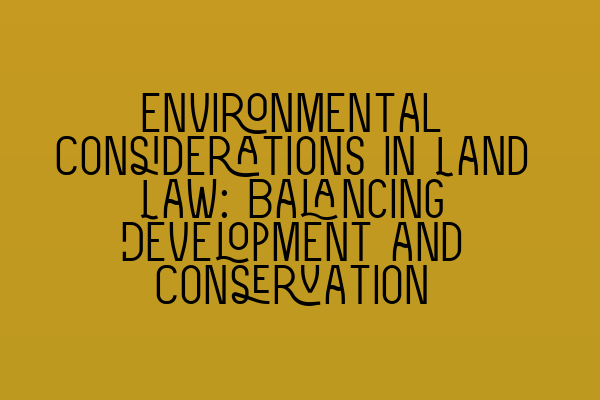Environmental considerations play a crucial role in land law, striking a balance between development and conservation. With the increasing awareness of environmental impacts and the need for sustainable practices, it is essential for property law professionals to have a deep understanding of the legal framework surrounding environmental considerations.
When it comes to land development, several legal aspects necessitate careful examination to ensure compliance with environmental regulations. These considerations include planning permissions, environmental impact assessments, conservation areas, and protected species.
Planning Permissions
Obtaining planning permissions is a fundamental step in any land development process. This process involves submitting an application to the local planning authority, which assesses the proposal’s compliance with various planning policies. These policies often include environmental considerations, such as protecting green spaces, preserving biodiversity, and minimizing carbon footprints.
To navigate this aspect of land law successfully, property law professionals need to be well-versed in the relevant planning policies and environmental regulations. Understanding how to draft effective planning applications that address these considerations can significantly influence the approval process and the overall success of a development project.
Environmental Impact Assessments
Environmental impact assessments (EIAs) are an essential part of land development projects that may have significant environmental effects. These assessments evaluate the potential environmental consequences of proposed developments and propose measures to mitigate or offset their impact.
Property law professionals play a vital role in ensuring that developers comply with EIA regulations and adequately address any potential adverse environmental effects. This involves conducting thorough assessments, coordinating with environmental experts, and advising clients on suitable mitigation strategies.
To excel in this aspect of land law, property law professionals must keep up-to-date with current EIA guidelines and possess the necessary skills to navigate the assessment process effectively. This expertise will help ensure that development projects are carried out within the bounds of environmental laws and regulations, promoting sustainable development practices.
Conservation Areas
Conservation areas are designated areas that possess special architectural or historic interest, requiring special attention and protection. These areas often include buildings, landscapes, or other features that contribute to the local heritage.
When dealing with land in conservation areas, property law professionals must be familiar with the specific regulations and restrictions that apply. This knowledge enables them to guide clients effectively and ensure compliance with the necessary conservation requirements.
In addition, property law professionals can provide guidance on obtaining listed building consent, which is required for any alterations or demolitions to listed buildings. Understanding the intricacies of these legal requirements helps to strike a balance between development and the preservation of cultural heritage.
Protected Species
Another crucial aspect of environmental considerations in land law is the protection of wildlife and habitats, including endangered or protected species. Development projects must take into account the potential impact on such species and adhere to regulations that safeguard their welfare.
Property law professionals need to be familiar with the legal protections surrounding protected species. This knowledge allows them to guide clients through the necessary processes, such as conducting ecological surveys, obtaining licenses, and implementing suitable mitigation measures when necessary.
By integrating environmental considerations into land law practices, property law professionals can contribute to sustainable and responsible development. Their expertise in navigating the legal complexities of environmental regulations ensures that development projects align with conservation goals, protecting the environment for future generations.
At SQE Property Law & Land Law, we understand the importance of environmental considerations in land law. Our team of experienced solicitors is well-versed in the legal framework surrounding environmental regulations and can guide you through the intricacies of compliance.
For more information and resources, visit our related articles:
- SQE 1 Practice Exam Questions
- SQE 1 Practice Mocks FLK1 FLK2
- SQE 2 Preparation Courses
- SQE 1 Preparation Courses
- SRA SQE Exam Dates
